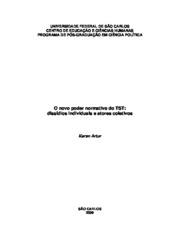| dc.contributor.author | Artur, Karen | |
| dc.date.accessioned | 2016-06-02T19:14:24Z | |
| dc.date.available | 2010-10-22 | |
| dc.date.available | 2016-06-02T19:14:24Z | |
| dc.date.issued | 2009-12-17 | |
| dc.identifier.citation | ARTUR, Karen. O novo poder normativo do TST : dissídios individuais e atores coletivos. 2009. 152 f. Tese (Doutorado em Ciências Humanas) - Universidade Federal de São Carlos, São Carlos, 2009. | por |
| dc.identifier.uri | https://repositorio.ufscar.br/handle/ufscar/949 | |
| dc.description.abstract | This research aims to analyze the institutional changes in labor law and in the Labor Justice courts after the Constitution of 1988. It focuses on the uniform decisions of the Superior Labor Court (TST), as well as the political dynamic between this court and the other powers and actors invested in the institution. We carried out a study of the jurisprudence of the court in individual conflicts, and conducted interviews with relevant actors to achieve this goal. Those interviewed include ministers of the TST, judges of the Labor Judges National Association, lawyers of the judicial advisory boards of the main national trade union centers, and law firms representing businesses and financial corporations. We concluded that the Labor Judiciary Power has been the leader in reforms of the institution itself, in addition to labor law in Brazil, and that it has conferred asymmetric powers to social actors in this process. Moreover, we indicate the limits of this leadership in our legislative model of labor relations. | eng |
| dc.description.sponsorship | Financiadora de Estudos e Projetos | |
| dc.format | application/pdf | por |
| dc.language | por | por |
| dc.publisher | Universidade Federal de São Carlos | por |
| dc.rights | Acesso Aberto | por |
| dc.subject | Ciência política | por |
| dc.subject | Brasil. Tribunal Superior do Trabalho | por |
| dc.subject | Justiça do trabalho | por |
| dc.subject | Direito do trabalho | por |
| dc.subject | Direito e política | por |
| dc.subject | Mudança institucional | por |
| dc.subject | Superior Labor Court -TST | eng |
| dc.subject | Labor Justice | eng |
| dc.subject | Labor law | eng |
| dc.subject | Law and politics | eng |
| dc.subject | Institutional Change | eng |
| dc.title | O novo poder normativo do TST : dissídios individuais e atores coletivos | por |
| dc.type | Tese | por |
| dc.contributor.advisor1 | Noronha, Eduardo Garuti | |
| dc.contributor.advisor1Lattes | http://lattes.cnpq.br/6908348693613769 | por |
| dc.description.resumo | Esta pesquisa visa a analisar as mudanças institucionais do direito do trabalho e da Justiça do Trabalho após a Constituição de 1988, focando nas decisões uniformes do Tribunal Superior do Trabalho (TST) e na dinâmica política entre o tribunal e os demais poderes e atores investidos na instituição. Para tanto, realizamos estudo da jurisprudência desta Corte sobre dissídios individuais e conduzimos entrevistas com atores relevantes. Tais entrevistas incluíram ministros do TST, juízes da Associação Nacional dos Magistrados do Trabalho, advogados da assessoria jurídica das principais centrais sindicais e de grandes escritórios de advocacia empresarial trabalhista. Concluímos que o Judiciário Trabalhista tem protagonizado as reformas na própria instituição e no direito do trabalho no Brasil, conferindo assimetrias de poder a atores sociais nesse processo político. Ainda, apontamos os limites desse protagonismo dentro do nosso modelo legislado de relações de trabalho. | por |
| dc.publisher.country | BR | por |
| dc.publisher.initials | UFSCar | por |
| dc.publisher.program | Programa de Pós-Graduação em Ciência Política - PPGPol | por |
| dc.subject.cnpq | CIENCIAS HUMANAS::CIENCIA POLITICA | por |
| dc.contributor.authorlattes | http://lattes.cnpq.br/6014314141747645 | por |
